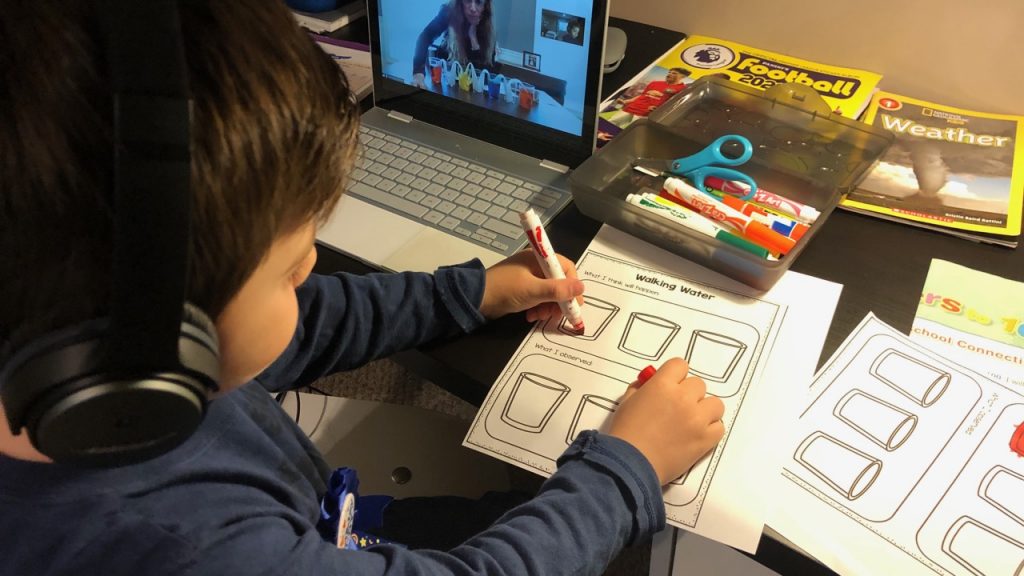It’s a little challenging to have a parenting blog and not talk about Covid-19 and homeschooling, mainly because DadsforCreativity explores topics related to early years education (my eldest is 9, and my youngest is 3).
As I reflect on the transition to homeschooling in March, I break into a hot sweat – it was intense! And I’m an educator. I’m supposed to be good at this stuff, right? In reality, we know the challenges we faced as a society were immense. We all experienced an increase in anxiety in response to the challenge of delivering on very different work commitments while also supporting our child’s schooling. We had to organize schedules for the home computers, identify work areas, setup daily zoom calls, and submit assignments on Google classroom. All this excludes the everyday parenting that equally intensified, as our children became quickly agitated by events.
See Also: Learning from Home: Shaping Small Education Opportunities
Some of us have begun to repeat this experience as schools return to another turbulent year. Given this situation, I thought I’d put together some articles that explore relevant topics in response to the increased responsibilities that we now experience (though in different ways). The first of these articles focus on supporting effective feedback during the lockdown, which we know can be highly effective for constructing knowledge.
Take Away: We’re not educators, but we can provide information so we are supporting effective feedback from a distance.
During the initial stages of the outbreak, useful feedback was one of my significant concerns as we made the transition, especially when introducing new topics (e.g., fractions). Although feedback comes in lots of different ways, I’m sure we all recognize the teacher’s important role when it comes to administering feedback. I’m not talking about grades, they have a role to play, but they are not considered an effective form of feedback from a learning perspective. I’m talking about the human interactions we experience in the classroom, the moment when the teacher poses a question and responds to the puzzled look on the child’s face, or when they discuss a problem presented on a worksheet and see an opportunity to elaborate. There’s also the conversations in groups that a teacher overhears as they make their way around the classroom—fellow students sharing misunderstanding about the material, which is then quickly addressed under normal conditions. Finally, a good teacher routinely evaluates their success in administering instruction, and this typically includes tapping into a sixth sense regarding engagement.

I thought there were some great moments of teacher creativity from a distance, but I think we all still developed concerns on how much time children spent on the computer. This information only seemed to become apparent through communication from parents.
How well did we do at replicating this level of feedback during the lockdown? I’m not sure of studies that have explored this question, but I remain concerned as we begin the new academic year.
As I think back to my role as a parent during this situation, I think the most significant contribution I made – from a homeschool learning perspective – was reviewing my boy’s work before submitting to Google Classroom and maintaining communications with their teachers. I recognized when my eldest had rushed through a worksheet and not addressed the questions correctly; I could pick up signs that my middle son needed more support toward the concept of estimation. And I concluded I don’t know enough about fractions to help my eldest son in any way when he was beginning to struggle. Consequently, I engaged with the teacher and shared my interpretations of how my child was progressing in response to the new material. These communications were sometimes short notes added to worksheets or more direct emails when necessary.
This final sentence addresses the main point I’d like to make. I believe that lockdown brought me closer to my boy’s schooling. Over the summer, I continued to challenge one son on his sight words, another son in his letter sounds, and another son on his multiplication. I was precise. I knew what they had done during the final semester. I knew their ability level and utilized this information during reading sessions, selecting apps for the iPad, or engaging discussions during dinner.
This new knowledge of my children is something I continue to cherish. I believe it brought us even closer together as a family. It certainly expanded my understanding of their learning beyond quarterly grade reports. However, as we begin the new school year, I think it’s important to highlight that parents are not teachers. We can’t effectively deliver feedback on our children’s work. We also don’t have time. Consequently, I recommend focusing our efforts to support one of the most crucial components of learning – feedback.
As parents, we have an opportunity to observe how our children respond to the temporary normal of formal schooling. We can review their worksheets, ask them questions, and, most importantly, communicate our observations to the teachers. They need our support. We need to be their eyes and ears as they deliver the instruction from a distance. They need this information to provide useful feedback, which I feel remains challenged under these current conditions.
We also know when our child has had enough time on the computer. We need to find ways to address this situation; a bored, hungry, frustrated, and fidgety child will struggle to master new concepts. As we communicate the information to teachers, we also need the patience to recognize they require time to process the data and consider a solution. What time of the day is most productive for your child? When is it appropriate to introduce new material? How might you revisit this material later in the day?
I write this article with a recognition of my boy’s privilege; during lockdown, I had the knowledge and time to support their schooling. This situation is not the same for everyone – which is why I believe we need all children to return to school ASAP. But I digress!
My point is simple. I hope that as the new year begins, we as a system of schooling can develop more robust methods of communication channels between parent and teacher. This communication channel is not one way; it must be a back and forth throughout the year. It’s something the system has always needed; we might not have an opportunity to be better.
Enough said. I’ll be following up with a 3 Question Interview with an expert in this space very soon.

1 comment
[…] See Also: Supporting effective feedback from a distance […]